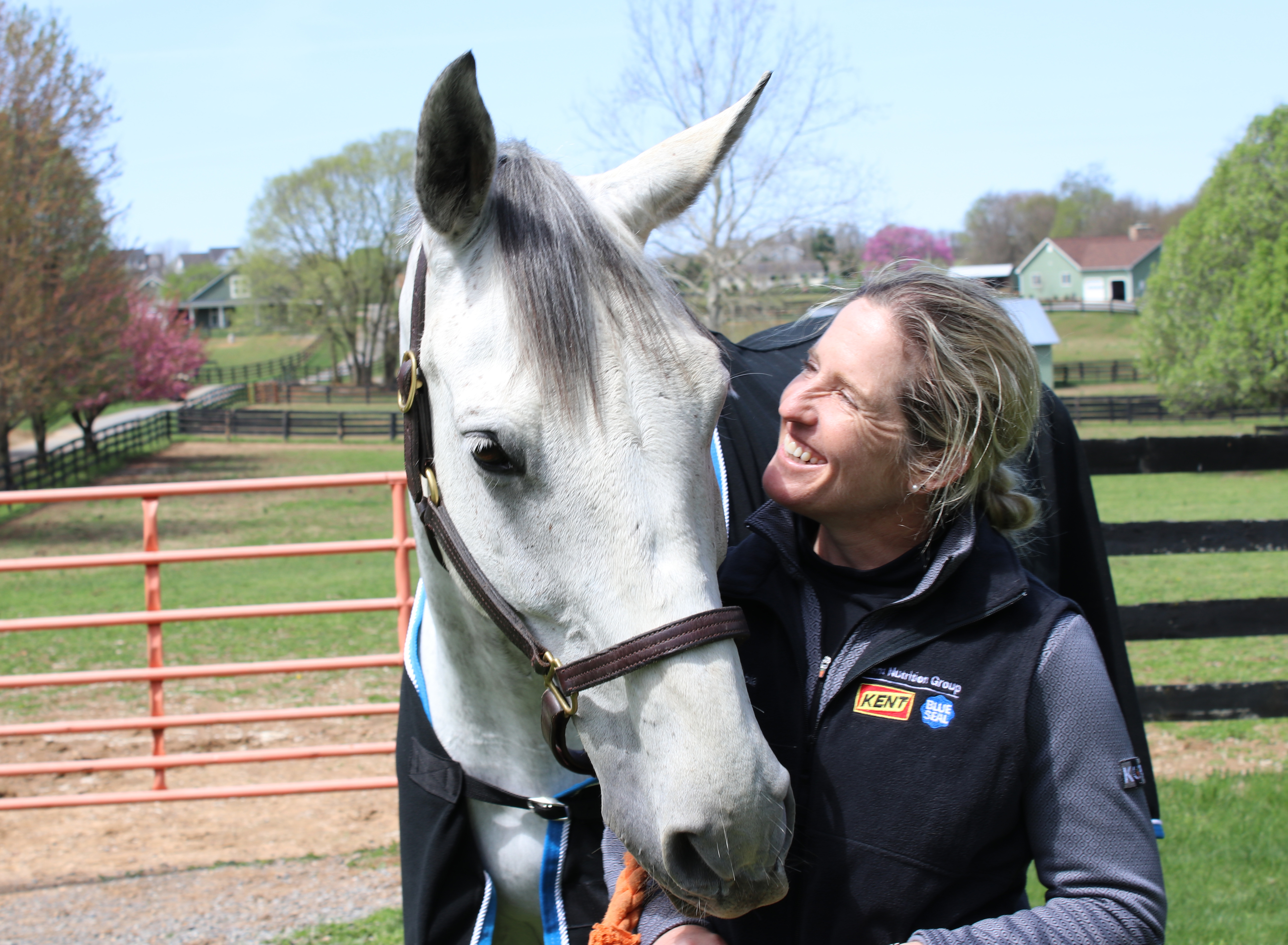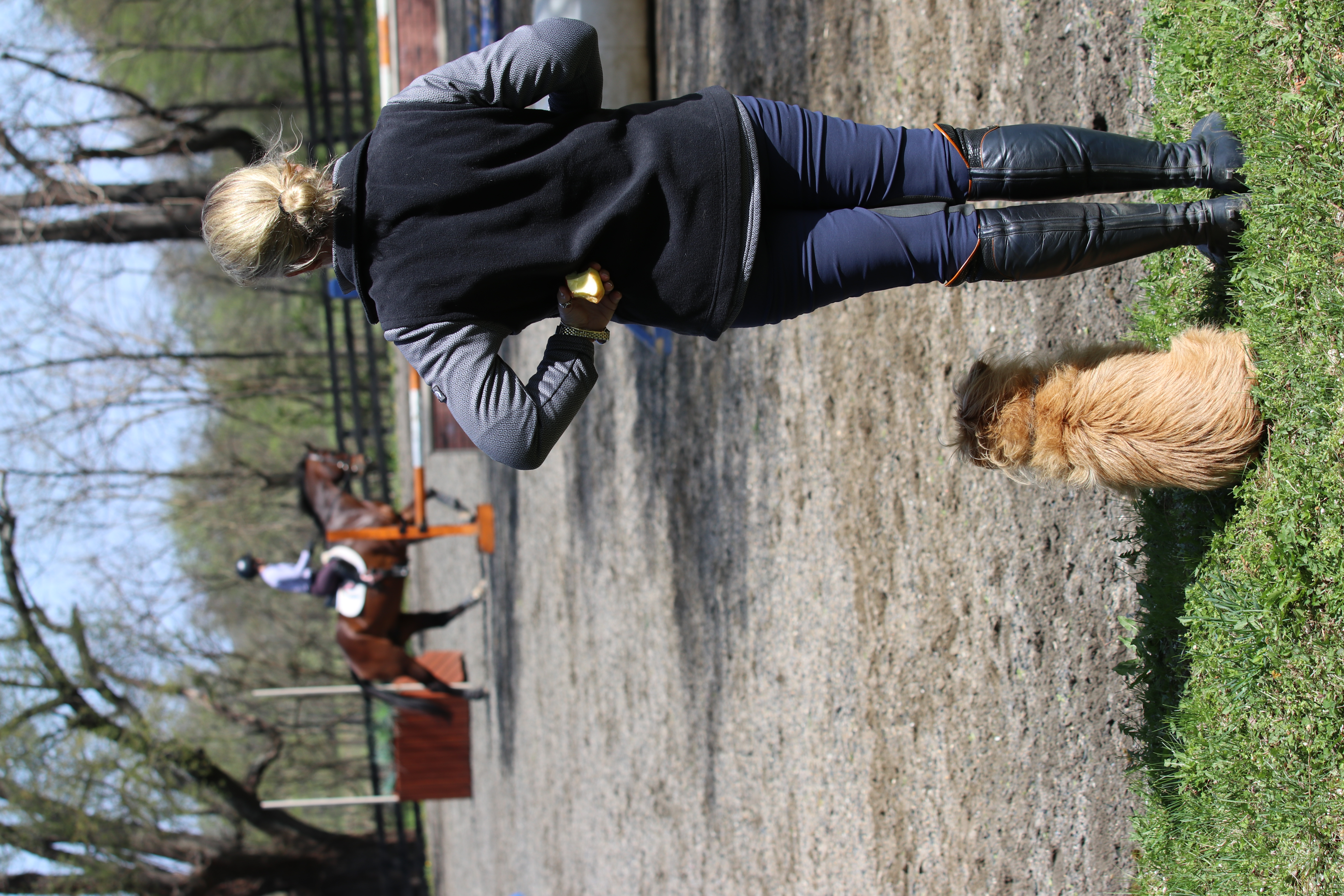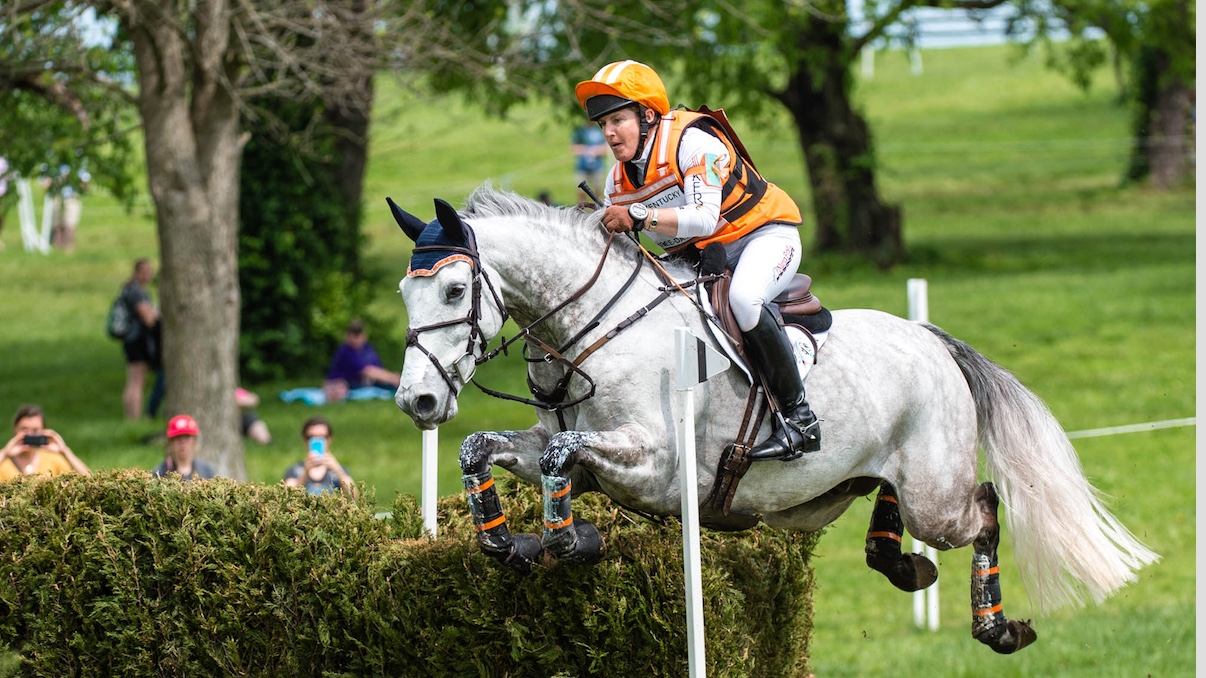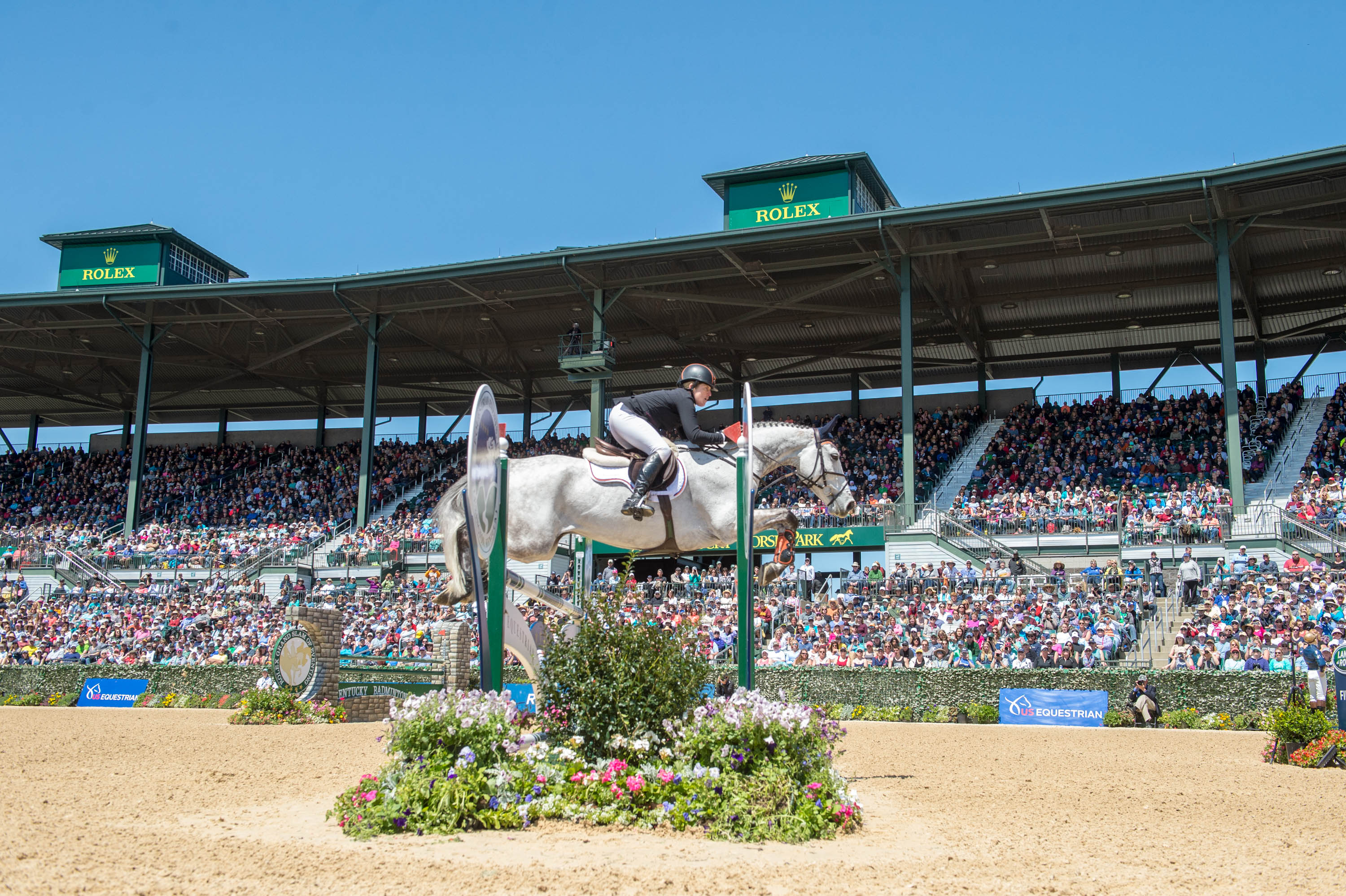I spoke with Sharon White at her Last Frontier Farm in West Virginia on the Tuesday before the Kentucky Three-Day Event which she was gearing up for Cooley on Show, her most seasoned horse at the moment. Sharon was extremely gracious to open her doors to me a time of the year that’s incredibly stressful for riders and we packed in a lot in three hours. I got to watch Sharon school one of her rising mounts over her cross-country course, I watched her work with a student who was having problems at the water drop, she coached a jump school with three other riders and we also had time to squeeze in an interview about her preparation for Kentucky with Cooley on Show, as well as this podcast.

Sharon has been a staple in the world of elite eventing for decades and has an incredibly dedicated following known as Team Orange. Sharon’s signature cross-country colors are orange and just about everything at her farm is orange, too—p addock gates, cross-country jumps, pitchforks, shovels—you name it. It’s easy to see why she has such a steadfast following, too. Sharon is incredibly positive and upbeat, and her laugh—which you’ll hear several times on the podcast—is contagious. But Sharon also has an incredible work ethic, a penchant for learning and relentless determination.
Here a just a few of the excerpts from our conversation which you can listen to in full below or on Apple podcasts, Stitcher and Soundcloud.
What riders or coaches have influenced you or served as mentors?
Sharon White: There are so many. I think it takes a village and I feel like I have been so lucky in my life to be surrounded by some really fantastic horsemen and women. I am forever grateful to all of them that have helped me in some way, shape or form. At the Great Falls Horse Center, one of my very first riding instructors there decided to move on and said, you should move with me, and I did and I ended up with a woman named Deana Vaughn, who had groomed for Torrance Watkins, so Deana has really shaped my life immensely. And then I ended up working for Torrance through the Deana connection and then from Torrance’s I went to Bruce Davidson’s. Again, I’ve just been around the best in the world my whole life and I am super, super lucky for that. When I moved back to Virginia from Pennsylvania, Jimmy Wofford was who I went to and he has been a part of my life ever since. I am lucky enough that he comes out to the farm. There’s just so many wonderful, amazing people that I’ve been put into contact through the wonderful and amazing people. Because of Jimmy, I’ve been to some really amazing dressage people—Linda Zang. I’ve now been overseas a bunch of times. I’m really lucky to have met some really good friends and peers and people who have really helped me around the world, and again, I’m just super grateful.

You also teach, why were you drawn to teaching and has it improved your own riding?
To be very frank, when you’re starting out in this business it’s a super hard business and you have to teach lessons to make money. It’s just something you did. So you want to be a horseman? Well, how do you support yourself? I went from working for Torrance and then working for Bruce and then when it was time to go out on my own, which is a risk you take. I galloped racehorses and taught Pony Club. That’s what you do. You start by teaching Pony Club. I think people start teaching before they should ever teach, which was certainly what I did. It is trial and error as you learn and grow. I don’t even think about teaching or coaching anymore, meaning its now something that’s a part of what I do. I’m fascinated by helping people learn about their horses. I’m fascinated and have a strong desire to help horses in the world by helping the people around them. So I think that’s first and foremost my interest level there and I think that is what makes me a good teacher because I’m very compassionate for the horses and most people who have horses are so it’s something I can help them with.
Who are some of your favorite horses?
SW: That’s a hard one. Right now it’s definitely Cooley on Show. I just am so ever grateful that he is in my life. I enjoy riding that horse every day. He cracks me up every day. He makes me laugh every day; just seeing him in the barn. He’s very special to me. He’s a wonderful horse who loves this job. It’s very lucky to find a horse that just loves the job so much and he finds it so easy. Obviously [it’s] hard work and he doesn’t always appreciate that and sometimes I think I love him too much, but I will not change that. I just hope to be able to keep producing him to the best of his ability and keep him physically and mentally fit and strong and doing the job well.

Other than that, I’ve had some wonderful horses throughout my lifetime. My first four-star horse Ready About—I’ll never forget her because the first horse you run around your very first four star—she was self-produced. It was a—I can’t say exactly because I can’t use foul language on this [laughs]—but what a disaster that was and what a great creature she was to go around with someone who had no idea what they were doing, not even a small clue, like none whatsoever. That’s why I think it’s so interesting that your first four-star horse—you know nothing, you know absolutely nothing—and aren’t they genuine and amazing to go do it. And then you learn, you just learn through the years and [with] experience you learn how to produce them better.
When you compete, do you get nervous and how do you cope with that?
SW: Absolutely I get nervous, and I’m way better about handling it than I used to be through years of work on mental—to be aware of what I’m thinking. Horses—I believe they go the way they’re ridden so if you are mentally wound tight because all of a sudden it matters, your results are not going to be what you want them to be and I think that’s fascinating, so I spend a lot of time working on what am I thinking and knowing what’s going on in my own mind then trying to control it. Which for me, I think it will be a lifelong thing I do every day. I’m a believer in meditation. I now can physiologically control my heartbeat really well so that’s really useful and it’s something everyone can learn to do, just so you know. It’s a question of just realizing that I personally I know I’m prepared. I know my horses, I’m not asking them to do something they can’t do, I know I’ve prepared and just knowing you can’t always control the results.

How do you handle it when things don’t go as expected?
SW: Also better than I used to [laughs]. All in due time. It really depends on the moment. You usually really know. So, when things aren’t super but you know that you gave it your best—there’s always a reason for everything. So your horse didn’t get through the event—well, was it because you were asking too hard of a question? Was it outside the horse’s capability? And sometimes you don’t know if they can do a level until you go and do it and if it’s that, I’m OK with it. I prepared, I tried and this horse is telling me he can’t do it—I’m OK with that. I struggle more when I know it’s because of my mental state. I know I got worried—usually it’s not about the job it’s because I worry that the horse is going to get hurt or I’m not going to make it to the big goal competition … so then I get upset with myself because it was unnecessary and that was letting the thinking mind take control as opposed to just doing what I know how to do. So, that’s a little harder for me because I know it and then I beat myself up, and you have to try not to do that, too.
What qualities do you feel make you a strong competitor and good horseman—what is it about your personality?
SW: I don’t give up. That makes me a good competitor. I persevere and that’s huge and I’m fascinated with learning. I love learning, I feel like I never could possibly know it all. Between those two [qualities] I think that puts me in a good place to be a good competitor. Sometimes I worry that I am not the competitor that some of my competitors are. I’m just fascinated by the whole thing and I find that interesting and that is again another part of learning. How do you learn to be the best competitor that you will never let your country down? That’s also fascinating and that’s my next goal to figure out.
ABOUT THE PRACTICAL HORSEMAN PODCAST
The Practical Horseman podcast will run every other Friday, features conversations with respected riders, industry leaders and horse-care experts to inform and inspire listeners. It will be co-hosted by myself and Practical Horseman editors Sandra Oliynyk and Emily Daily. Upcoming conversations are with eventing legend Jimmy Wofford, eventers Buck Davidson, and Great Britain’s William Fox Pitt as well as top hunter rider Liza Boyd. You can subscribe and listen to the podcast on Apple Podcasts, SoundCloud, Stitcher and while you’re there please rate and review the show.






